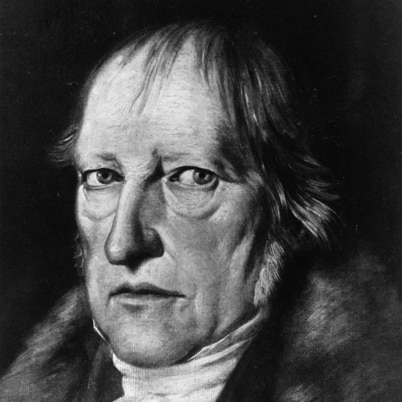Georg Wilhelm Friedrich Hegel was born in August 27, 1770, in southwest Germany, in a town called Stuttgart. His father was a civil servant in the department of finance. He had one sister and a brother. Throughout growing up and studying, he was known as “the old man” because of his strict study habits. However, he was not considered an exceptionally gifted student. Hegel received his Master of Philosophy degree in 1790 and then started to study for his theological exam. In September of 1793, he passed his theological exam, but was too poor to take up parish work so he became a tutor. He hated tutoring in a house in Bern, Switzerland. However, the family did have a good library, which he used to advance his learning.
Human freedom is the central theme of modern political philosophy, and Hegel offers perhaps the most systematic modern attempt to  understand the state as the realization of human freedom. In this comprehensive examination of Hegel’s philosophy of freedom, Paul Franco traces the development of Hegel’s ideas of freedom, situates them within his general philosophical system, and relates them to the larger tradition of modern political philosophy. Franco then applies Hegel’s understanding of liberty to certain problems in contemporary political theory. He argues that Hegel offers a powerful reformulation of liberalism that escapes many of the problematic assumptions of traditional liberal doctrine and yet avoids falling into the romantic and relativistic excesses of a substantial communitarianism.
understand the state as the realization of human freedom. In this comprehensive examination of Hegel’s philosophy of freedom, Paul Franco traces the development of Hegel’s ideas of freedom, situates them within his general philosophical system, and relates them to the larger tradition of modern political philosophy. Franco then applies Hegel’s understanding of liberty to certain problems in contemporary political theory. He argues that Hegel offers a powerful reformulation of liberalism that escapes many of the problematic assumptions of traditional liberal doctrine and yet avoids falling into the romantic and relativistic excesses of a substantial communitarianism.
Hegel’s aim was to set forth a philosophical system to comprehensive that it would encompass the idea of his predecessors and create a conceptual framework in term of which both the past and future could be philosophically understood. Such an aim would require nothing short of a full account of reality itself. According to Hegel, the task of philosophy is to chart the development of Absolute Spirit .This involves in :-
(1) making the internal rational structure of the Absolute clear.
(2) demonstrating the manner in which the Absolute manifests itself in nature and human history.
(3) explicating the theological nature of the Absolute, that is showing the end or the purpose which the Absolute is directed to.
Hegel’s thoughts on Reality:
Hegel believed that all real things in the world are ultimately one, so he is a monist (considers everything one). Hegel also stated that the study of history is “the thought that Reason rules the world.” Hegel had a reoccurring idea that Reason, and Reason only rules the world.
Hegel’s Thoughts on Bodies :
Hegel distinguishes between organic and inorganic bodies. Most of what he says agrees with Kant, however he points out that these ideas were originally for Plato. He states that physical reality encompasses both inorganic and organic matter. “We have now to make the transition from inorganic to organic Nature, from the prose to poetry of Nature.”
Hegel’s thoughts on Personality :
Hegel claims that “the actions of human beings stem from their needs, their passions, their interests, the satisfaction of selfish desire.” Hegel also believes that the historical process interrelates two great elements, “the first is the Idea, the other is human passion; the first in the warp, the other the woof in the great tapestry of world history that is spread out before us.” “But world history is not a place for happiness. Periods of happiness are empty pages in history, for they are the periods of harmony, times when the antithesis is missing.”
Hegel’s Thoughts on Knowledge :
Hegel proves a very interesting view of knowledge. He thinks that that knowledge is used, “either as the instrument to get hold of the Absolute, or as the medium through which one discovers it.”
Hegel’s Thoughts on Morality :
To Hegel, the ideals of moral virtue “are empty, ineffectual words which lift up the heart but leave reason unsatisfied, which edify, but raise no edifice.” Hegel believed that everyone should speak the truth, in his or her own eyes. “‘Everyone ought to speak the truth.’ In this duty as expressed unconditionally, the condition will at once be admitted: if he knows the truth. The commandment, then, will now run: everyone ought to speak the truth at all times, according to his knowledge and conviction.”
